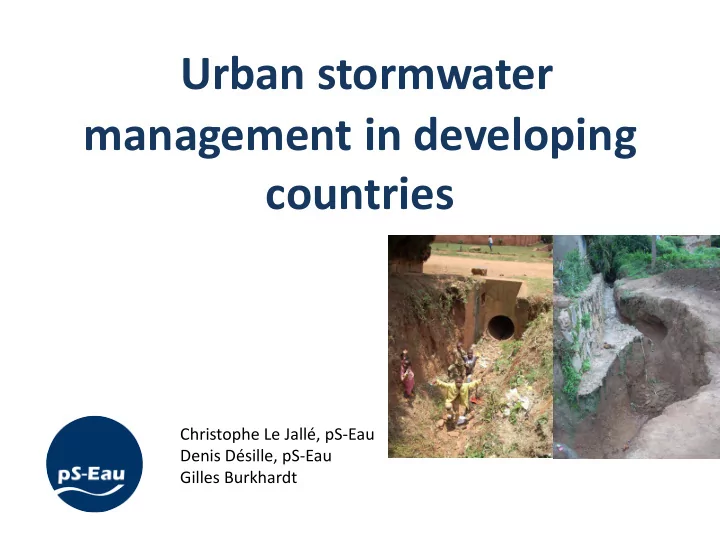

Urban stormwater management in developing countries Christophe Le Jallé, pS-Eau Denis Désille, pS-Eau Gilles Burkhardt
Context Why to focus on Urban stormwater management: • because stormwater is one frequently raised by local decision-makers in developing countries • because this issue becomes particularly problematic when there is heavy rainfall that floods the settlements situated in the lowest parts of towns • because effects of such rainfall are manifold: sanitation, material, economic and environmental impacts
Objective of the study • To analyse issues and existing practices in stormwater mater management in developing countries • In order to identify the needed areas for research Urban stormwater management, as understood in this document, refers to all the measures undertaken to improve the way in which the flow and volumes of water generated by rainfall and surface runoff in urban areas are controlled and managed.
LESSONS LEARNED FROM THE LITTERATURE REVIEW
Stormwater management history in developed countries • Step one: channel and store for evacuation or flow management (before 1980’s) public health + hydraulic approach • Step two: treat the discharge and regulate flow (1980’s) regulatory and environmental approach • Step three: reuse the stormwater considered as a resource (End of 20 th ) regulatory and environmental approach Long process before to consider stormwater not only as constraint, but also as a resource
Issues driving stormwater management in developing countries • Increasing urbanisation of the world’s population is constantly creating new challenges for stormwater management. • Although rain is vital for both human beings and their environment, rainfall events generate flows and volumes of water difficult to control The impacts of lack of stormwater management can be broken down into four categories: public health, infrastructure, economic and environmental.
Stagnant water and disease transmission - the health consequences of poor drainage Source : (Cairncross et Ouano, 1991)
Impacts of lack of stormwater management • Safeguarding public health – Stormwater-related diseases – Accidents and injury • Protecting the land, housing and urban infrastructure • Safeguarding economic development • Protecting the environment
Factors influencing stormwater management Factors directly linked to Natural factors • • stormwater management – Rainfall patterns (frequency and – Lack of coordination intensity): between sector – Characteristics of the catchment stakeholders area – Poor alignment of planning – Soil type to local capacities – Presence of a river – Failure to take the Human activity-related factors • populations’ expectations – Extension and densification of into account urban areas – Limited local capacities for – Impermeability financing investment, operation and – Degradation of plant cover maintenance Factors linked to the management • of urban space – Lack of planning and poor land management – Overlap between stormwater, wastewater, solid waste and drinking water
Innovative activities implemented in developing countries • Activities for improving • Activities influencing the stormwater management natural factors – Improving operation and – Controlling runoff upstream maintenance services from the city – Using alternative techniques – Reducing erosion – Involving different stakeholders • Activities for improving • User-targeted activities the management of – Flood risk prevention and urban space reduction strategies – Developing multi-service – Involving the most approaches vulnerable users in the improvement of the service – Integrated management of urban water
Conclusion and way forward All this analysis highlights the needed to go forward. It suggests for us the following areas for research: • The different scale of intervention and complementarity between a global approach and small scale interventions • Inclusion of the storm water management in urban management • Interrelation/complementarity between stormwater management and other urban services • Analysis the real cost of the stormwater management • Explore new technological approach, low cost technology • User participation
Thank You! www.pseau.org
Recommend
More recommend